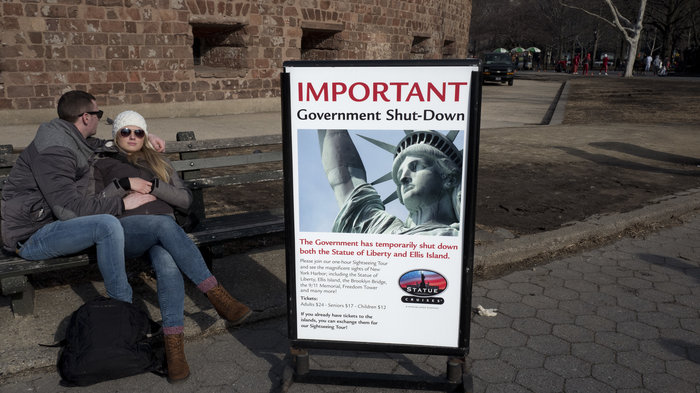Understanding the Government Shutdown
Photo courtesy of Mark Lennihan, Associated Press. Tourists rest on a bench on Sunday in lower Manhattan as they wait for the Statue of Liberty to re-open.
January 23, 2018
Hundreds of thousands of federal workers were either sent home or told not to show up to work at all on Monday, as the government shutdown starting last Friday began to affect workers around the nation. But what does this really entail? What is a government shutdown in the first place, and should we, as students, be concerned?
Congress needed to pass a budget resolution by the end of last Friday to fund federal programs. Obviously, a budget was not approved for the upcoming fiscal year and nonessential functions of the U.S. government close until the lawmakers can agree on a bill. Most significantly affected were the Departments of Education (“more than 90 percent of its total 3,912 person staff to be furloughed during the first week of a shutdown,” according to NPR) and Housing and Urban Development.
The last time we had a shutdown, in 2013, the National Parks were infamously closed. This year, parks will stay open, but many staffers and rangers weren’t on duty.
According to Nathan Rott said on NPR’s Weekend All Things Considered, many rangers are frustrated: “By keeping the parks open, the Department of Interior is basically saying that we can do this whole national park thing without you guys. And in reality, they don’t think that’s going to work.”
However, the Statue of Liberty will remain open, as the state of New York agreed to temporarily take charge of managing the monument.
“New York State will reopen the Statue of Liberty and Ellis Island tomorrow. We will not stand by as this symbol of freedom and opportunity goes dark,” NY governor Andrew Cuomo tweeted on Sunday.
Controversy arose, as this is the first time a government shutdown has occurred while a single party controlled both Congress and the Executive office. News agencies and citizens looked to other nations as foreign bodies criticized the management of legislation under the new administration.
For example, China’s official news agency blamed the “chronic flaws” in U.S. politics and berated Trump for having the anniversary of his first year in officer tarnished by the failure of Congress and the Executive office to negotiate a deal to settle the budget, according to the Washington Post.
Elsewhere in the world, constitutions and political systems have regulations in place to prevent situations like ours. In Australia, for instance, budgets must be passed or else the government is usually forced to resign or parliament becomes involved. Similar restrictions have been put in place in New Zealand, Bangladesh, and Canada.
So, the final question remains: what can we, as students, do to assuage the blow dealt by the government shutdown? As always, writing letters to Congress, texting your local representatives, and otherwise maintaining contact with your local lawmakers is the most direct and effective way to express your concerns and make your voice heard.






